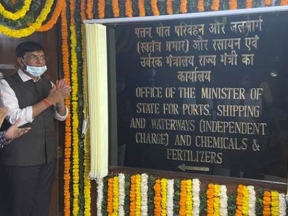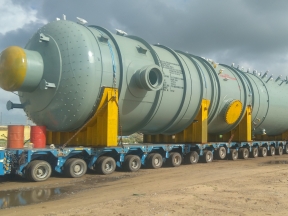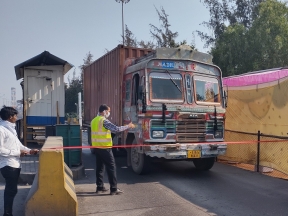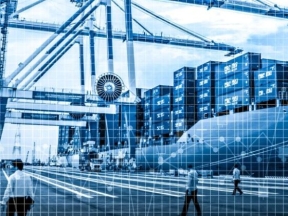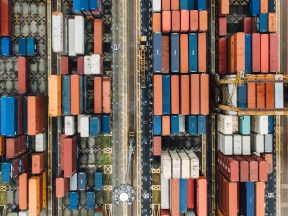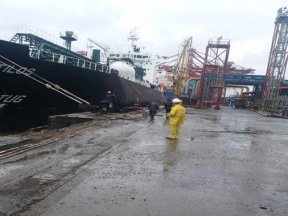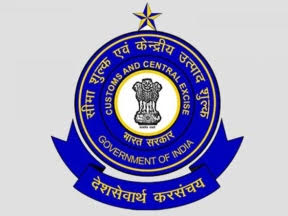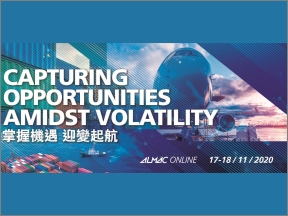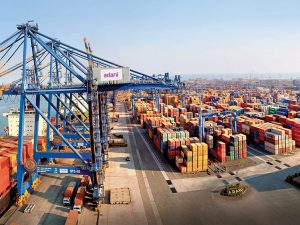Following the announcement, made by Prime Minister Narendra Modi, of renaming Ministry of Shipping to Ministry of Ports, Shipping and Waterways, Mansukh Mandaviya, Union Minister of Shipping, states during the formal unveiling of plaque ceremony, “It is indeed a matter of pride that with Prime Minister’s vision, the country is moving ahead with a holistic and long-term approach of multi-modal connectivity.” He added that he is indeed grateful to Prime Minister for his foresight regarding the expansion of the scope of work as far as ports, shipping and waterways are concerned. He says, “With the changed name, the Ministry is going to put extra focus on the development of Waterways and coastal shipping. Around 1400 km of waterways have already been fully developed and additional 1000 km is being developed on priority for which DPR/feasibility study has been completed. We are also focusing for creation of a Port Grid, encompassing various smaller ports like fisheries port, agriculture port and mineral port etc so that port development and port-led development takes place in the country.” Sanjeev Ranjan, Secretary & Sanjay Bandopadhyaya, Addl Secretary, Ministry of Ports, Shipping and Waterways, Dr. Amita Prasad, Chairman, IWAI, Amitabh Kumar, DG Shipping, T.K. Ramachandran, Chairman, IPA, along with chairmen of all the major ports and senior officials of the Ministry attended the ceremony through video conferencing. While making this historic announcement, PM said “Now this Ministry will be known as Ministry of Ports, Shipping and Waterways. It is being expanded. In most of the developed economies, the Shipping Ministry is also responsible for Ports and Waterways. In India, the Shipping Ministry has been doing a lot of work related to Ports and Waterways. Now with …
Read More »Allcargo makes a record, moves 76-metre long super-sized cargo for L&T Hydrocarbon
Allcargo Logistics has moved a 76-metre long super consignment from L&T Hazira in Gujarat to IOCL Paradip in Odisha, achieving a rare feat of successfully managing one of the largest over-dimensional cargo (ODC) movements in India. The Projects & Equipment (P&E) division of Allcargo Logistics showed exemplary commitment and operational efficiency while managing the entire multimodal ODC project cargo movement for its client L&T Hydrocarbon. The movement of nine super ODC comprising heavy equipments such as glycol field stripper, vacuum effect evaporator and MEG column delivered efficiently from Manufacturing Yard in Hazira to Project Location in IOCL Paradip. “It was a huge multimodal logistics affair as the mission involved direct transportation of six packages from L&T factory to Adani Hazira Port by road, vessel voyage from Adani Hazira Port to Paradip Port (PICT) and land transportation from PICT to IOCL Refinery using shore road,” the company informs. The movement also involved the transportation of three packages from L&T Jetty to Adani Hazira Port by vessel and from PICT to IOCL site by road. Overcoming few operational challenges and maneuvering constraints, the team of project logistics professionals at Allcargo Logistics planned and executed the transportation with perfection and utmost safety banking on incisive knowledge and unparalleled multi-modal transport operations efficiency. Allcargo also pressed into service its advanced equipment and operators to ensure smooth movement of the ODC. “There are always inherent challenges involved in the process of moving ODC. In this case, challenges multiplied due to size and shape. However, our P&E team rose to the occasion and demonstrated extraordinary commitment and proficiency to ensure safe and hassle-free multimodal movement, delivering superior customer satisfaction. Our specialised project movement service has set …
Read More »APM Terminals Pipavav goes live with RFID container tracking service at the port
Terminal Pipavav has commenced Integrated Container Tracking (ICT) system introduced by National Industrial Corridor Development Corporation Ltd (NICDC) under Logistics Data Bank (LDB) project. NICDC Logistics Data Services (NLDS) has completed vital infrastructure at APM Terminals Pipavav to commence the near real time visibility of the container movement across the supply chain. This will help in tracking the container from port to Container Freight Stations (CFSs), Inland Container Depots (ICDs) and end users and would help in enhancing the visibility and efficiency of the container movement thereby improving the competitiveness of the Exim trade. LDB was developed to address the critical issue of tracking movement of containers across various ports and provide insights to trade. It integrates the information available with various agencies across the supply chain to provide detailed real time information within a single window. With this expansion 100% of India’s container volume will be covered under LDB project. Currently around 28 million EXIM containers pan India have received services. Jakob Friis Sørensen, Managing Director, APM Terminals Pipavav said, “It’s an honour to become a part of this nation-wide project of NICDC that will streamline container movement across logistics value chain and identify inefficiencies and bottlenecks to develop strategies to ensure the development of the sector.” He adds, “The visibility of containers throughout the entire supply chain provides multiple benefits to trade, including transparency, integration, lesser paperwork and improved planning for arrival, unloading and final delivery.” A separate Special Purpose Vehicle (SPV) has been formed by the Govt. of India between NICDC and NEC Corporation, Japan namely “NICDC Logistics Data Services Limited” (NLDSL) to execute LDB across entire logistics value chain. LDB is now functional at 17 ports, …
Read More »Portall collaborates with BoxnBiz for freight booking via PCS 1x
In a bid to offer services on P-CaSo, Portall Infosystems has announced collaboration with BoxnBiz, an inbuilt cloud-based Indian freight forwarding solution-based offering air freight, ocean freight & customs clearance. P-CaSo, a collaborative platform for the ecosystem is integrated into the Indian Port Community System to bring various services, including services such as eBL, blockchain document transfer (BDT), trucking aggregation services, eVGM and e-learning, certificate of origin. The addition of freight quote to the existing pallet of services will allow PCS 1x users to access the ocean freight portal’s booking, get instant freight quotes for FCL & LCL services along with end to end tracking & visibility with 3000+ port pairs to serve import & export needs, saving and sharing documents and payments. Shirishchandra Shah, Chief Product Officer, Portall Infosystems, said, “Our partnership with BoxnBiz would bring synergy & value additions in the maritime community as we once again make our footprint in the digitisation space. I thank Indian Ports Association for their wholehearted support & wish BoxnBiz a very best of luck in their journey with us.” Biplob Barik, Founder & CEO, BoxnBiz said, “With this partnership, we expect that the adoption of digitalisation in the international shipping space will increase and the maritime sector will take a greater step towards digitalization. The present pandemic has no doubt shaken the way businesses work. Now it is time to change and we want to contribute to this journey together with Portall.”
Read More »PM Modi renames Ministry of Shipping as Ministry of Ports, Shipping and Waterways
Prime Minister Narendra Modi has renamed the Ministry of Shipping as the Ministry of Ports, Shipping, and Waterways during a launch event of Ropax ferry service between Ghogha (Bhavnagar) and Hazira (near Surat) in Gujarat, via video conferencing. “The name of Ministry of Shipping is being changed to Ministry of Ports, Shipping, and Waterways,” said PM Modi said. The decision to change the name of the Shipping Ministry is part of government’s efforts to revamp the ports and create world-class Inland Water Transport. “The Ministry of Shipping encompasses within its fold shipping and port sectors which include Shipbuilding, Ship-repair, Major Ports, National Waterways, and Inland Water Transport,” the ministry wrote in a blog published on its official website. According to the ministry, “The capacity of the ports in terms of their berths and cargo handling equipment needs to be vastly improved to cater to the growing requirements of the overseas trade. The shipping industry needs to be enabled to carry higher shares of the sea-borne trade in indigenous bottoms.”
Read More »Cargo volumes at major Ports decline 12.43% during April-October; falls for the seventh straight month in 2020
According to Indian Ports Association, India’s Major ports has recorded 12.43 per cent decline in cargo traffic during April to October period of current fiscal to 354.818 million tonnes (mt). In the wake of the COVID-19 outbreak, sharp declines were witnessed in handling of containers, coal and POL (petroleum, oil and lubricant) among other commodities. These ports handle about 61 per cent of the country’s total cargo traffic. They handled 705 MT of cargo last fiscal. Cargo volumes at these 12 major ports have declined for the seventh straight month in October 2020. During the April-October period of the last fiscal, these 12 major ports had handled 405.20 MT of cargo. The 12 major ports handled 354.81 MT of cargo between April and October this fiscal, according to the Indian Ports Association (IPA) which said that the “percentage variation against previous year traffic during April to October 2020 vis-a-vis April to October 2019” has been 12.43 per cent. Defying the broader trend, Mormugao saw an increase of 16.47 per cent in cargo handling to 10.17 MT during April-October period this year. Cargo handling at Kamarajar Port (Ennore) nosedived 30.56 per cent during April-October to 12.53 MT, while ports like Chennai, Cochin and Mumbai saw their cargo volumes drop about 20 per cent during the said period. JNPT and Kolkata ports suffered sharp declines of 18 per cent and 14 per cent respectively. Deendayal Port saw cargo volumes dip by 11.5 per cent, while VO Chidambarnar recorded a dip of 10.8 per cent and cargo handling at New Mangalore and Visakhapatnam dropped by over 5 per cent. Paradip Port recorded a decline of about 4 per cent. However, the recovery has …
Read More »JNPT records growth in container traffic by 11.24% in October over last month, handles LPG of 1,07,530 MT
JNPT handled 423,155 TEUs in October, registering a growth of 11.24% in October 2020 compared to previous month and growth of 5.10 per cent over the same month last year. Out of this, 52,087 TEUs were handled at JNPCT (3.37%), 64,254 TEUs at NSICT (+77.78%), 153,548 TEUs at APMT (-7.50%), 80,500 TEUs at NSIGT (-5.32%) and 72,766 TEUs at BMCT (+11.82%). The overall traffic handled was 5.73 million tons (MT) during October compared to 5.44 MT in October 2019, posting a growth of 5.37 per cent. The port handled a record number of 548 trains in October, beating the previous highest of 536 trains handled in May 2011. Commenting on this, Sanjay Sethi, IAS, Chairman, JNPT, says, “This was possible due to the conscientious and excellent team efforts of all stakeholders, terminals, Railways and train operator’s both CONCOR and private operators.” The port also achieved a new milestone by handling the highest LPG of 1,07,530.67 MT at JNPT-Liquid cargo terminal through seven vessels in October 2020 surpassing earlier record of 92,877 MT in August 2019. For the period of April-October 2020, JNPT handled 5,66,815 MT discharge of LPG which is 14.27% higher as compared to 4,96,052 MT handled in the same period LY. JNPT is giving priority and timely berthing to the LPG vessels for fulfilment of distribution of LPG, under Pradhan Mantri Ujjwala Yojna. At the Liquid Cargo Terminal, JNPT is also handling essential commodities like high speed diesel, Motorspirit, Edible oil etc. LPG is transported through 13.5 KM cryogenic pipeline from ship (JNPT Berth) to LPG BPCL bottling plant at Uran. LPG is then distributed by rail/road /pipeline to Maharashtra, Goa, Madhya Pradesh, Karnataka, Telangana, Punjab, Delhi and …
Read More »CBIC issues revised policy and guidelines for setting up of ICDs, CFSs and AFSs
In a bid to meet the requirement of new paradigm and the aspiration of the trade, CBIC has issued revised policy and guidelines for setting up new Inland Container Depots (ICDs), Container Freight Stations (CFSs) and Air Freight Stations (AFSs). The new policy takes into account the present capacity, future growth potential and regional imbalances and also addresses the need for bringing uniformity, transparency and seamless approval process. It further addresses the identified regulatory and logistics concerns associated with the hard and soft infrastructures of ICDs/CFSs/AFSs in India. The new policy establishes a framework of functional requirements pertaining to the design and operation of dry ports as well as establishes certain processes to enable sustainable growth of the sector. Lastly, the new policy aims to lay down appropriate institutional, administrative and regulatory frameworks for development and smooth operation of ICDs/CFSs/AFSs, including procedures for regulatory inspection and the execution of applicable customs control and formalities.
Read More »Asian Logistics, Maritime and Aviation Conference to go online on November 17-18
In light of the global pandemic, the 10th Asian Logistics, Maritime and Aviation Conference (ALMAC), an annual signature event for the industries jointly organised by the Government of the Hong Kong Special Administrative Region (HKSAR) and the Hong Kong Trade Development Council (HKTDC), will go online for the first time. The conference will be held online on November 17-18. Themed “Capturing Opportunities Amidst Volatility”, over 40 luminaries from the logistics, maritime and aviation sectors will share their insights towards industries’ prospect and business opportunities. Running on November 17 and 18 under the theme “Capturing Opportunities Amidst Volatility”, ALMAC Online will focus on three key areas – rebuilding supply chain resilience under the new normal, Asia’s evolving role in global supply chains, and the trendsetting technologies and innovations for reinvigorating logistics operation and management – to help industries navigate through a challenging business environment. More than 40 leaders from the logistics, maritime and aviation sectors will share their insights at the event, which is expected to attract around 2,000 industry elites from 25 countries and regions. “The COVID-19 pandemic is creating significant obstacles to the global business environment, making this an unsettling year for the logistics, maritime and aviation industries. For the 10th iteration of ALMAC, we have created a brand-new online platform – the first time the HKTDC has ever staged its flagship conference online which is a new experience without geographical boundaries,” said HKTDC Deputy Executive Director Patrick Lau. “Industry representatives, professionals and stakeholders from across the globe will be able to participate and interact during the online conference. Industry leaders and experts will share their valuable experiences and strategies on supply chain resilience in the new normal and …
Read More »APSEZ expects cargo throughput, excluding Krishnapatnam Port, of 225-230 MMT in FY21
With easing of lockdown and revival of economy, cargo throughput at APSEZ rebounded and registered a spectacular growth. Adani Ports and Special Economic Zone (APSEZ) has announced its operational and financial performance for the second quarter and half year ended September 30, 2020. The growth was across segments and coasts. In the month of October’20 ports excluding Krishnapatnam Port (KPCL) handled cargo volume of 22 MMT which is a growth of 21 per cent on a year on year basis. KPCL the newest port in our portfolio handled cargo volume of 3.2 MMT. For FY21, we expect cargo throughput excluding Krishnapatnam Port to be in the range of 225-230 MMT. In addition Krishnapatnam Port is expected to handle around 20 MMT in H2 FY21. On the back of rebound in economic activities, cargo volume bounced back and registered a phenomenal growth of 36% on a QoQ basis and 7 per cent on a YoY basis. All segments of cargo registered growth on a QoQ basis. While coal registered 30 per cent growth, container grew by 34 per cent, crude by 52 per cent and other bulk cargo registered a growth of 40 per cent. Non-Mundra ports registered a growth of 28 per cent, while Mundra port grew by 40 per cent. Cargo volume at Hazira grew by 45 per cent, Kattupalli by 54 per cent and Dahej by 145 per cent. Registering double digit growth, cargo volume at Dhamra Port increased by 30 per cent on QoQ basis and 21 per cent on YoY basis. LNG and LPG which was added as part of our diversified cargo portfolio in October 2019 gained traction. In Q2 FY21, Mundra Port handled 1,42,000 …
Read More » Cargo Breaking News
Cargo Breaking News
